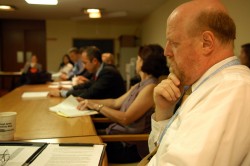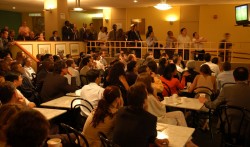Posted by Mary under New York, Oxfam
No Comments
 It became difficult to write daily updates in the closing days of the conference, mainly because I was there until midnight on Wednesday 5th and until 2.30am on Thursday 6th July. The President scheduled informal sessions on those evenings to try and reach consensus on some of the more contentious elements of his outcome document – future of the process, arms trade, ammunition, civilian posession, etc.
It became difficult to write daily updates in the closing days of the conference, mainly because I was there until midnight on Wednesday 5th and until 2.30am on Thursday 6th July. The President scheduled informal sessions on those evenings to try and reach consensus on some of the more contentious elements of his outcome document – future of the process, arms trade, ammunition, civilian posession, etc.
I left the conference to return to DC on Friday 7th at 3.30pm. Little had happened until that point. Governments were talking to each other bilaterally to try and sort out some of the problems and all indications pointed to an evening session to finalize the outcome document. Instead when I arrived in DC close to 6pm I received a text from my colleague that read: “total meltdown. no outcome document. complete failure of UN arms trade conference.”
 It turns out that the President of the meeting gave up in his attempt to get the governments to agree to the final outcome document and closed the conference just before 6pm Friday. He then did a press conference where he described the meeting as a success because the 2001 Programme of Action (PoA) remained “an enabling framework that empowered states, international and regional organizations and other relevant organizations and civil society†to work to end the illicit trade in small arms.
It turns out that the President of the meeting gave up in his attempt to get the governments to agree to the final outcome document and closed the conference just before 6pm Friday. He then did a press conference where he described the meeting as a success because the 2001 Programme of Action (PoA) remained “an enabling framework that empowered states, international and regional organizations and other relevant organizations and civil society†to work to end the illicit trade in small arms.
UN Secretary General Kofi Annan subsequently expressed disappointment that delegates were unable to agree on a common declaration to guide further action. Without an outcome document from the meeting, states in effect are left with guidance on future implementation of the PoA and no mandate to meet again although Canada has said it will go ahead and convene an unofficial and informal meeting in May 2007 to discuss the need for global controls on arms transfer controls between states.
 The NGOs to the conference had focused much of their attention and effort on influencing the outcome document language and spent less time educating governments on what would be required to negotiate an Arms Trade Treaty. This is because the ATT was not seen as achievable via the 2001 PoA and they did not want to detract attention from the PoA. Here’s a link to the press statement by Control Arms… In it, the NGOs blame a small number of countries (Cuba, India, Iran, Israel and Pakistan) for holding the rest of the conference hostage due to the decision-making process that guided the conference.
The NGOs to the conference had focused much of their attention and effort on influencing the outcome document language and spent less time educating governments on what would be required to negotiate an Arms Trade Treaty. This is because the ATT was not seen as achievable via the 2001 PoA and they did not want to detract attention from the PoA. Here’s a link to the press statement by Control Arms… In it, the NGOs blame a small number of countries (Cuba, India, Iran, Israel and Pakistan) for holding the rest of the conference hostage due to the decision-making process that guided the conference.
 I organized a reception last night at the family catering business (Wareham House!) to inaugurate Oxfam New Zealand’s Wellington office. It was a lot of fun. About eighty representatives of the capital’s diplomatic, political, media, and non-governmental organizations came. We were especially pleased that Hon. Luamanuvao Winnie Laban agreed to speak. She is Minister for the Community and Voluntary Sector and also member of parliament for the Mana electorate, where my parents live.
I organized a reception last night at the family catering business (Wareham House!) to inaugurate Oxfam New Zealand’s Wellington office. It was a lot of fun. About eighty representatives of the capital’s diplomatic, political, media, and non-governmental organizations came. We were especially pleased that Hon. Luamanuvao Winnie Laban agreed to speak. She is Minister for the Community and Voluntary Sector and also member of parliament for the Mana electorate, where my parents live.













